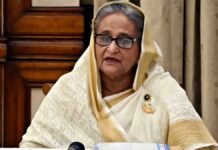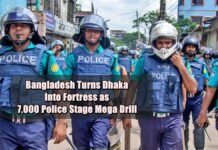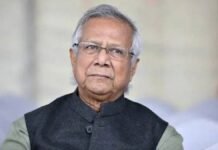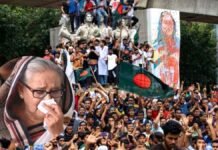
Key Points
- International Crimes Tribunal set to announce verdict on November 17 against Sheikh Hasina for crimes against humanity
- Prosecutors demanded death penalty, property seizure to compensate victims of July 2024 protests
- Over 17,000 police, Border Guard Bangladesh (BGB), and army personnel deployed across Dhaka and other districts
- Awami League called two-day nationwide shutdown, triggering violent protests, arson attacks, and crude bomb explosions
- Verdict proceedings broadcast live on state TV and streaming platforms, with large screens installed across Dhaka
- Garment industry faces severe economic crisis as political instability threatens Bangladesh’s largest foreign exchange earner
Dhaka: Bangladesh’s International Crimes Tribunal delivered its highly anticipated verdict on Monday, November 17, 2025, in the crimes against humanity case against former Prime Minister Sheikh Hasina, marking a watershed moment in the country’s political history. The three-judge panel, headed by Justice Md. Golam Mortuza Mojumder concluded the trial involving Hasina and two former senior security officials, former home minister Asaduzzaman Khan Kamal and ex-inspector general of police Chowdhury Abdullah Al-Mamun. The verdict was broadcast live on state-run BTV and streamed on the tribunal’s official Facebook page, with large screens installed at multiple locations in Dhaka to allow public viewing.
Security Forces On High Alert
Ahead of the verdict announcement, Bangladesh deployed unprecedented security measures across the country, with over 17,000 Dhaka Metropolitan Police personnel, Border Guard Bangladesh (BGB), Rapid Action Battalion, and army troops positioned at strategic locations. Fourteen platoons of BGB were specifically deployed in the capital and adjoining districts of Narayanganj and Gazipur to assist local administration in maintaining law and order. Home affairs adviser Brigadier General (retd) M Sakhawat Hossain issued shoot-on-sight orders, stating authorities would shoot those showing intent to kill, as security was tightened around government buildings, the Secretariat, and the tribunal complex.
Violent Protests Erupt Nationwide
The days leading up to the verdict witnessed widespread violence across Bangladesh, as the banned Awami League announced a two-day nationwide shutdown starting November 13. Protesters set vehicles on fire, detonated crude bombs, and blocked highways with stones and barricades, creating an atmosphere of fear and insecurity. The Awami League’s office in Dhaka was set on fire by rioters, marking the second time the building was torched since the party’s ouster in August 2024. Streets in Dhaka remained largely deserted as firecracker-like explosions echoed through residential areas, with at least one person killed in violence in Mymensingh.
Charges Stem From July 2024 Student Uprising
The case centers on alleged crimes against humanity committed during the student-led protests of July-August 2024, when prosecutors claim the Hasina government violently suppressed demonstrators. The tribunal framed charges under five counts on July 10, with the first count alleging murder, attempted murder, torture, and other inhumane acts. According to the United Nations, at least 1,400 people died during the crackdown, with 12 to 13 percent of casualties resulting from live fire by police and the student wing of the Awami League. The tribunal concluded trial proceedings on October 23 after 28 working days, during which 54 witnesses testified about efforts to suppress the student movement.
Prosecution Seeks Maximum Punishment
Chief Prosecutor Mohammad Tajul Islam and his team sought the highest possible sentence for Sheikh Hasina and Asaduzzaman Khan Kamal, along with seizure of their properties to be distributed among families of martyrs and injured victims. Attorney General Md Asaduzzaman presented closing arguments citing international precedents where prime ministers and top leaders were tried for crimes against humanity, urging the tribunal to impose the death penalty. However, Hasina, now 78 years old and residing in India, has denied all charges against her, calling the tribunal a “kangaroo court” run by her political opponents in interviews with international media.
Trial Conducted In Absentia
Sheikh Hasina and Asaduzzaman Khan Kamal were tried in absentia after the court declared them fugitives following their flight from Bangladesh on August 5, 2024, when the student uprising forced the collapse of the Awami League government. Hasina fled to India, where she currently resides, while the interim government led by Nobel laureate Muhammad Yunus has sought her extradition, though India has yet to respond to the request. Former IGP Abdullah Al-Mamun, initially an accused, turned state witness and provided detailed testimony describing how directives from top officials were executed during the crackdown.
International Legal Concerns Raised
UK-based law firm Doughty House Chambers submitted an urgent appeal to the United Nations, arguing that Hasina was being tried in an environment charged with political vengeance under an unelected interim government with no democratic mandate. The Awami League filed a petition with the International Criminal Court (ICC) in The Hague, accusing Muhammad Yunus’ administration of crimes against humanity, including killings and arbitrary arrests of party members. Under ICT-BD law, Sheikh Hasina would be barred from challenging the verdict in the Supreme Court’s Appellate Division unless she surrendered or was arrested within 30 days after its delivery.
Garment Industry Faces Economic Crisis
Bangladesh’s vital garment industry, the country’s largest source of foreign exchange earnings, expressed deep concern over escalating political turmoil and its impact on the economy. Former BGMEA President Kwazi Moniruzzaman warned that continued political instability could erode foreign buyer confidence and plunge the sector into a deeper economic crisis, affecting millions of workers, particularly women. The Bangladesh Garment Manufacturers and Exporters Association (BGMEA) reported substantial financial losses of approximately Tk 6,400 crore (around $534 million) due to factory closures, communication breakdowns, and disruptions during the peak Christmas shipping season.
The industry, which contributes significantly to Bangladesh’s export earnings and employs millions of people, faced production drops of 15-20 percent compared to the previous year, with several small factories closing or working on subcontracts for larger operations. Former BGMEA president Gholam Sarwar Milon stated that during similar political unrest in 2014, it took three years for the industry to recover to previous levels.
Political Repercussions Ahead Of Elections
Political analysts suggest the verdict could have significant repercussions, arriving just months ahead of scheduled national elections in a deeply divided nation. The Awami League remains banned from political activity under the interim government led by Muhammad Yunus, who took charge after Hasina’s ouster. Home affairs adviser Chowdhury stated that whatever verdict was delivered would be executed, signaling the government’s determination to see the process through. The verdict represents the first major judicial accountability measure following the July 2024 uprising that fundamentally altered Bangladesh’s political landscape.

















































